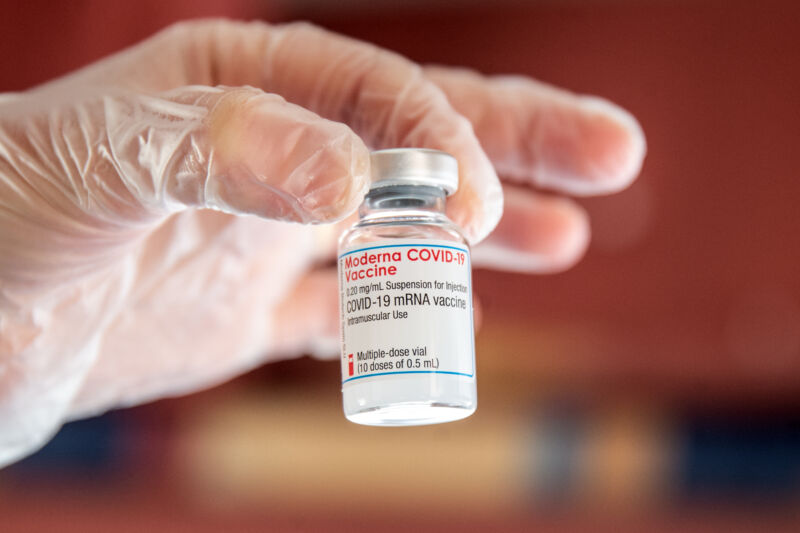
Researchers have given out the first jabs of a tweaked version of Moderna’s COVID-19 vaccine, one aimed at fighting one of the most concerning coronavirus variants—the B.1.351 variant, first identified in South Africa.
The jabs are part of an early trial of the tweaked vaccine, which is being run by the NIH’s National Institute of Allergy and Infectious Diseases (NIAID). The agency aims to enroll around 210 healthy adults in the trial by the end of April.
“The B.1.351 SARS-CoV-2 variant, first identified in the Republic of South Africa, has been detected in at least nine states in the United States,” NIAID Director Anthony Fauci said in an announcement. “Preliminary data show that the COVID-19 vaccines currently available in the United States should provide an adequate degree of protection against SARS-CoV-2 variants. However, out of an abundance of caution, NIAID has continued its partnership with Moderna to evaluate this variant vaccine candidate should there be a need for an updated vaccine.”
Data so far on the B.1.351 variant (aka 501Y.V2) suggests that it may be about 50 percent more transmissible than earlier versions. It also appears to evade immune responses from previous infections and current vaccines. Experiments in the lab found that it took about six times the amount of antibodies from recovered COVID-19 patients to neutralize the variant, compared with the amount needed to neutralize an earlier version of the virus. The variant also appeared to knock back Johnson & Johnson’s vaccine; the vaccine appeared 72 percent effective at preventing symptomatic COVID-19 in the US but was only 64 percent effective in South Africa while the B.1.351 variant was widely circulating.
B.1.351’s concerning abilities likely stem from key mutations in its spike protein, the protruding protein that juts from the outside of SARS-CoV-2 viral particles. The virus uses the spike protein to bind to and gain entry into human cells. Some of the most potent antibodies against the virus bind to the spike, where they can physically block the virus from binding cells.
Tweaks and tests
The original Moderna vaccine works by delivering to human cells the genetic code for the SARS-CoV-2 spike in mRNA form. Once delivered, our cells read the code and make their own spike protein, which is used to train immune responses to spot and destroy any invading SARS-CoV-2. For the tweaked version of the vaccine, researchers at Moderna simply incorporated key mutations from the B.1.351 variant’s spike protein into the mRNA code used in the vaccine.
As Fauci mentioned in his statement, it’s unclear how necessary these variant-specific vaccines will be, given that current vaccines do provide some protection. However, with SARS-CoV-2 still widely circulating in the US and worldwide, the virus has ample opportunities to continue mutating. With every new infection, there are more chances for mutations and new variants to arise, which in turn increases the chances that variant-specific vaccines will be a fixture in our future.
To understand how variants might fit into current vaccine use, the new NIH trial is testing 10 different vaccine regimens. Approximately 60 of the 210 people the institute aims to enroll will be people from the original Moderna vaccine trial, who were first immunized against COVID-19 last year. Some of those people will get a single booster shot with just the variant-specific vaccine, while others will get a booster that contains a mix of the original vaccine and the variant-specific vaccine.
The remaining 150 people in the trial will be those who have not received any COVID-19 vaccines yet. Two groups of 15 will get three shots at varying dosages, 28 days apart: two doses of the original vaccine, then a variant-specific booster. Two groups of 20 will get just two shots at varying dosages of the variant-specific booster. Two groups of 20 will get two shots at varying dosages: a dose of the original vaccine and then a variant-specific booster. Lastly, two groups of 20 will get two shots, each with mixtures of both the original and variant-specific vaccine at varying dosages.
Researchers will then monitor the participants for safety issues, side effects, and immune responses against SARS-CoV-2 viruses.
https://arstechnica.com/?p=1753609

